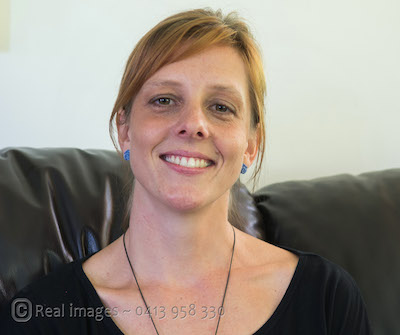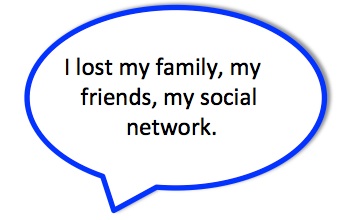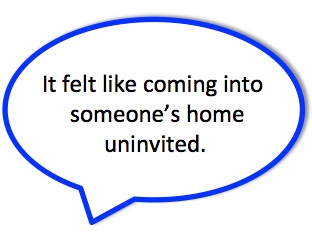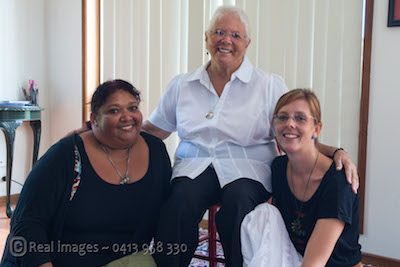 Stephanie Hunt |
Stephanie Hunt |  Thu, February 20, 2014 at 17:06 |
Thu, February 20, 2014 at 17:06 | ********************************************************
 Finding Connection
Finding Connection
Pip found what she was looking for in the Aboriginal community of Toomelah, near Boggabilla on the floodplains of far north New South Wales.
“It wasn’t the sort of place I’d ever been before. It was raw, but real. Not like the suburbs with our white picket fences where everything is hidden,” she says.
Here in this home to the Gamilaroi people, Pip Gordon, white woman with all the western trappings, regained a sense of belonging that had been lost. “Being with the women in their community I found my way back to my own spirituality.”
----------
Pip’s childhood had been steeped in religion. She grew up in the comfortable, leafy Sydney suburb of Turramurra within the sheltered embrace of the Jehovah’s Witnesses. “Everyone I knew was a Witness. It’s what I knew, what I believed and where I felt safe,” says Pip.
She left school at 15 to begin preaching. “At train stations, knocking on doors….I was doing about 60 hours a month of preaching. I’ve been hosed off front lawns, dogs set on me…but I was just 100% dedicated.”
But by 18 cracks had started to show in her dedication. “I’m telling people how to live their lives and I’m so young…I know nothing,” Pip says, recalling the early seeds of doubt.
 She had saved her money and decided to look abroad for some answers. She travelled throughout Europe. “I’d go to the churches and I’d preach over there,” she says. But the doubts lingered. “Then I booked myself into an Islam school in Malaysia,” she recalls with a laugh. But she didn’t find her answers there. By the time she returned to Australia, aged 20, all she knew was that it was time to leave the church.
She had saved her money and decided to look abroad for some answers. She travelled throughout Europe. “I’d go to the churches and I’d preach over there,” she says. But the doubts lingered. “Then I booked myself into an Islam school in Malaysia,” she recalls with a laugh. But she didn’t find her answers there. By the time she returned to Australia, aged 20, all she knew was that it was time to leave the church.
“I couldn’t just leave,” Pip explains. “I went through a disfellowship process. Afterwards I wasn’t to associate with any Jehovah’s Witnesses ever again. So I lost my family, my friends, my social network.”
Pip pauses. “I don’t know how I did what I did to leave.” Tears well up as she says it was her husband Jonathan that carried her through. A Northern Irelander, she had met him while hitchhiking through Europe. He was in Australia to support her through the disfellowshipping process and they moved to Belfast together soon after.
Disentangling yourself from deeply embedded beliefs takes more than a formal ex-communication. “It was all wrapped into my belief about who I was,” says Pip. “I had to open all the boxes and have a good look.”
Pip faced the full force of her shunning when she and Jonathan returned to Sydney two and half years after they had left. “I went through huge anxiety and experienced panic attacks….but I needed to feel it.”
After she had married Jonathan, moved to Newcastle and decided to have children Pip re-examined her faith yet again. “There is a belief that having been a Jehovah’s Witness and left, I would destine my children to death. That created a lot of pain and confusion.”
With her first child, Caleb, she attempted to return to the church. “I needed to decide what I believed. I didn’t want to sit in this void and not deal with it,” she says. “In the end I decided it definitely wasn’t for me and that was a relief."
“But then I didn’t have anything else,” she says. “How was I going to fill the emptiness?”
----------
She arrived in Boggabilla and Toomelah six years later to study Aboriginal healing as part of a Diploma of Community Recovery. The family had moved to Coffs Harbour in 2007 and Pip was working for Chandler Macleod recruitment company. As part of a Centrelink contract to employ a more culturally diverse call centre, Pip began meeting people from backgrounds different from her own – refugees, migrants, Aboriginal peoples.
“All of a sudden I became aware of this desire to know more about Aboriginal people,” Pip remembers. “I felt so ignorant.” She enrolled for the diploma and received a placement at Boggabilla and nearby Toomelah. As she drove past the long grasses and dry scrub and then down the dirt road into Toomelah, she was terrified that as an outsider she would be judged.
 “I was so nervous,” Pip recalls. “I prayed again for the first time in years, asking for some sign that I was doing the right thing. I put my hand against the window of the car and it was so hot, and suddenly it felt like someone was holding my hand. I know now it was the ancestors.”
“I was so nervous,” Pip recalls. “I prayed again for the first time in years, asking for some sign that I was doing the right thing. I put my hand against the window of the car and it was so hot, and suddenly it felt like someone was holding my hand. I know now it was the ancestors.”
She drove into town, spotting the rainbow serpent painted on a brick wall and the children kicking a footy in the street. “It felt like coming into someone’s home uninvited,” says Pip. “It was a real eye-opener.”
But she quickly found peace in her daily routine at Boggabilla and Toomelah. Pip would spend her days wandering down to the TAFE for classes, finding a shady spot to write in her journal and drinking cups of tea with powdered milk.
Her own pre-conceived fears of being judged created challenges. “I had to work through not knowing if I was accepted. I also had to work through the shame of being a white person when they shared their stories.”
Those stories made Pip realise that she really didn’t know the true history of Australia. When she came home after her first visit she watched the SBS series First Australians. As she watched she envisioned the women she had met in Toomelah and Boggabilla and she grieved. “We had been taught how to wail up there as a way to draw out the pain,” she explains. “I wailed! I felt the pain and it was my pain.”
“I’m not sure if they thought I’d come back, but I kept showing up,” says Pip. Over time trust and affection grew. The women of Toomelah shared their stories and invited Pip to tour their land. “I felt welcomed.”
“Some people think Aboriginals need to be fixed and yet I was being healed by them,” says Pip. “It was so powerful but I wondered what I should do with this gift.”
----------
“Let’s create sacred women’s business in Coffs Harbour.” Her friend Jenny first voiced the idea but Pip knew it was right as soon as the words were out.
Pip had found herself yearning to be Aboriginal. She felt disconnected from her own culture, and envied her Toomelah-family their ancient heritage and ceremonies.
When she shared this with Jenny Ellis, a Gamilaroi woman Pip had met through mutual friends, she was surprised when Jenny admitted a similar sense of disconnection. She was Gamilaroi, but living on Gumbayngir land, she too was separated from her own people. The women agreed that something must be done to create connection in the community.
 (L-R) Jenny Ellis, Bea Ballangarry, Pip“Once you know this stuff you can’t just shut it out,” explains Pip. “At work I would talk to people about their jobs and they would tell me how isolated and disconnected they felt. I just had to share what I had learned.”
(L-R) Jenny Ellis, Bea Ballangarry, Pip“Once you know this stuff you can’t just shut it out,” explains Pip. “At work I would talk to people about their jobs and they would tell me how isolated and disconnected they felt. I just had to share what I had learned.”
“Let’s take this to the feet of our Elders,” said Jenny and they sought the support of local Elder Aunty Bea Ballangarry. “She said she’d been waiting for something like this,” Pip recalls and the seeds were sown for WOW Women of the World.
The sound of drumming and the scent of incense opened the first WOW event in 2011. Aboriginal ceremony, dance and healing were shared with a diverse array of 250 women – immigrants, Aboriginals, longtime locals, sea-changers, refugees – all lured by the promise of connection.
The need was real. WOW has now finished its third year and has developed a life of its own. Pip says it is a model for bringing people together and creating spaces where people feel safe.
Now she wants to take it further. In recent months Pip has started a social enterprise called The Gathering Tree that takes the ideas developed in WOW into other areas of the community.
“Aboriginal, Asian and African cultures honour their Elders. As a western society, we don’t,” says Pip. The first social enterprise project for the WOW women set up regular Circles for elder women at the Women’s Health Centre. “White women are not recognised for their wisdom. So we bring them to sit with our Aboriginal and African elders and they are honoured. We give them a place to say you’re valid, we love you and we want to hear your stories.”
Listening to other people’s stories and creating spaces for other people to feel included has finally brought Pip her own sense of belonging, and a whisper of possibilities. “This experience of being with elders and different cultures has been an immense privilege. I feel I’ve got no choice – I must be brave, be bold and just go for it.”
“I imagine that if we are really able to empower Aboriginal and non-Aboriginal people to come together in Circles and listen to stories that there would be mass change in Australia. It’s about taking it back to the You and the Me and what we have in common,” says Pip. That’s powerful dreaming for a once lost white girl.
**********************************************************
Pip tells me that the most interesting person she knows on the Coffs Coast is Lady Carmelle Chester - now that's a mouthful! She is in the women's Elders Circle, so Pip has heard her stories and feels they need to be shared. "She has lived!" says Pip. So I will be making my way up to Half Way Creek to find out about Lady Carmelle.
 Stephanie Hunt |
Stephanie Hunt |  Thu, February 20, 2014 at 17:06 |
Thu, February 20, 2014 at 17:06 |
Reader Comments (5)
Very interesting. As someone who was raised in a sect, "lost faith" and experienced some of the edges of indigenous women's health, i can relate to Pip's story...
This was truly an interesting journey through Pip's life.
Thanks Stephanie for bringing her story to our attention, even though I personally know Pip, reading her story makes me feel more aligned to her journey in life.
Beautifully written story